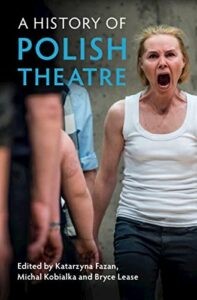New and original look at the complex pasts of Polish theatre

A History of Polish Theatre offers a new and original look at the complex pasts of Polish theatre. The editors – Cambrige Uniwersity Press - wished to move away from strictly devised forms of periodization, and instead build historical narratives through ‘constellations’, a direct reference to Walter Benjamin, who constructed novel conceptions of historical time and historical intelligibility based on the relationship not between the past and the present, but between the ‘then’ and the ‘now’; and to Tadeusz Kantor, who created constellations of entombed memory in his own artworks from the perspective of ‘here and now’.
The book is underpinned by the fundamental question of a title. Should this be A History of Polish Theatre or A History of Theatre in Poland? If the former, then how should Polishness be understood, and in which ways might contributors intervene into problematic discourses of ethno-nationalism that have dominated historical studies of national identity that fail to include ethnic and religious minorities? If the latter, where exactly is Poland? And when or how might historical phenomena be interpreted as Polish? Poland has been a testing ground for the limits of nationhood, political autonomy and geographical integrity through multiple occupations and partitions and wars. Borders have been drawn and redrawn. ‘Poland’ as a signifier is nevertheless instructive, allowing us to ask a range of questions of broad geographical landscapes. For this reason, we do not limit Polish theatre to the Polish language. Poland remains a conceptual tool that allows contributors to consider and reflect upon its changing and developing historical articulations, spatial configurations and cultural constructions. Siding with the title ‘Polish theatre’ recognizes that Poland as a nation was erased from the map of Europe at significant moments in the historical trajectory, and also places pressure on identifications of Polishness as singularly ethnically or linguistically produced. A History of Polish Theatre thus takes into account the problematic nature of the heterogeneous concept of national theatre. The structure of the volume includes, on the one hand, the peripheral nature and multiculturalism of Polish theatre, with the presence of Jewish, German and Lithuanian theatre makers, the influence of Italian, French and Russian stage cultures, and Shakespeare’s vivid presence on Polish stages.
The multiplicity of approaches to individuals, companies and theatres challenges narrow or singular forms of historiography. At the same time, we open up forms and approaches to theatre making beyond the traditionally defined bounds of the director, the writer, the scenographer and the actor.
While major debates are occurring in Poland in 2021 concerning structural gender inequality as well as the relationship between the director and the performer in creative environments, this collection queries the seemingly incontestable values and lineages of standard historiographies that are foundationally patriarchal. We chart the move from heteronormativity to empowered presence for women, LGBTQ groups, and other marginalized ethnic and linguistic groups.
The book tells about theatre cultures under socialism, the emergence of canonical practitioners and training methods, the development of dramaturgical forms and stage aesthetics and the political transformations attending the ends of the First and Second World Wars. Subjects of far-reaching transnational attention such as Jerzy Grotowski and Tadeusz Kantor are contextualised alongside theatre makers and practices that have gone largely unrecognized by international readers, while the participation of ethnic minorities in the production of national culture is given fresh attention. The essays in this collection theorise broad historical trends, movements, and case studies that extend the discursive limits of Polish national and cultural identity.
Katarzyna Fazan is Professor in the Theatre and Drama Department at Jagiellonian University and in the State Academy of Theatre Arts in Kraków. She is Editor-in-Chief of the series Teatr/Konstelacje. Her book publications include Projekty intymnego teatru śmierci. Wyspiański-Leśmian-Kantor (2009), Kantor. Nie/Obecność (2019); and with Anna R. Burzyńska and Marta Bryś, Dziś Tadeusz Kantor! Metamorfozy śmierci, pamięci i obecności/Tadeusz Kantor Today: Metamorphoses of Death, Memory and Presence (2014).
Michal Kobialka is Professor of Theatre Arts at the University of Minnesota. He has published over 100 articles, essays, and reviews. His book publications include Further on, Nothing: Tadeusz Kantor’s Theatre (2009), Theatre/Performance Historiography: Time, Space, Matter (2015), co-edited with Rosemarie Bank, and Tadeusz Kantor’s Memory: Other Pasts, Other Futures (2018), co-edited with Natalia Zarzecka.
Bryce Lease is Reader in Theatre & Performance Studies at Royal Holloway, University of London and Co-Editor of Contemporary Theatre Review. His publications include After ’89: Polish Theatre & the Political (2016) and, as editor, Contemporary European Playwrights (2020). He is Principal Investigator for the AHRC-funded project ‘Staging Difficult Pasts: Of Objects, Narratives and Public Memory’.